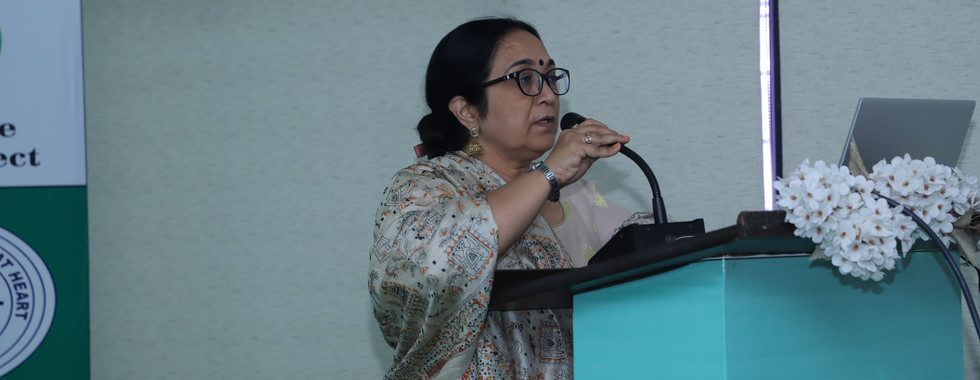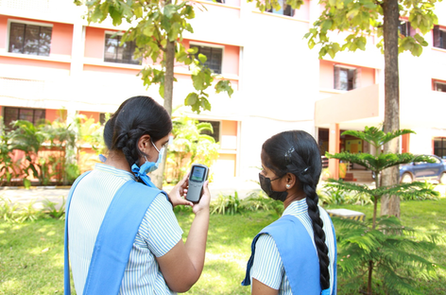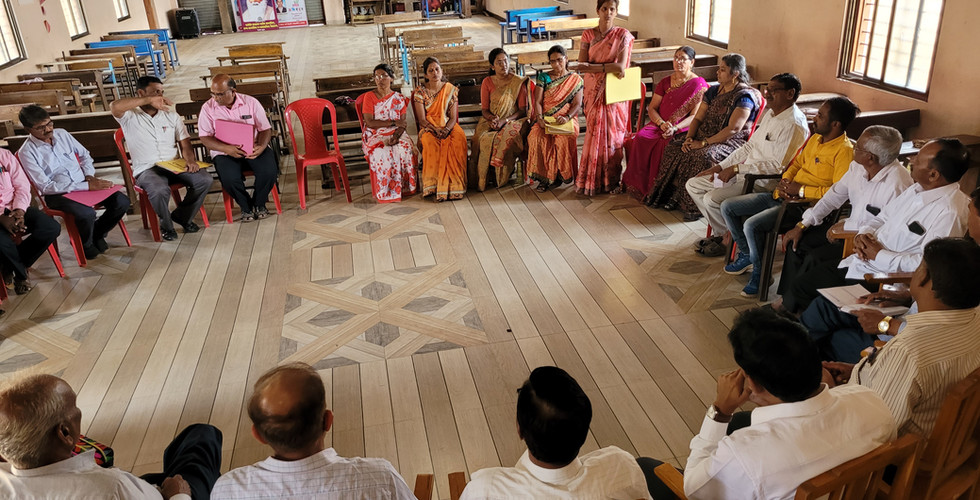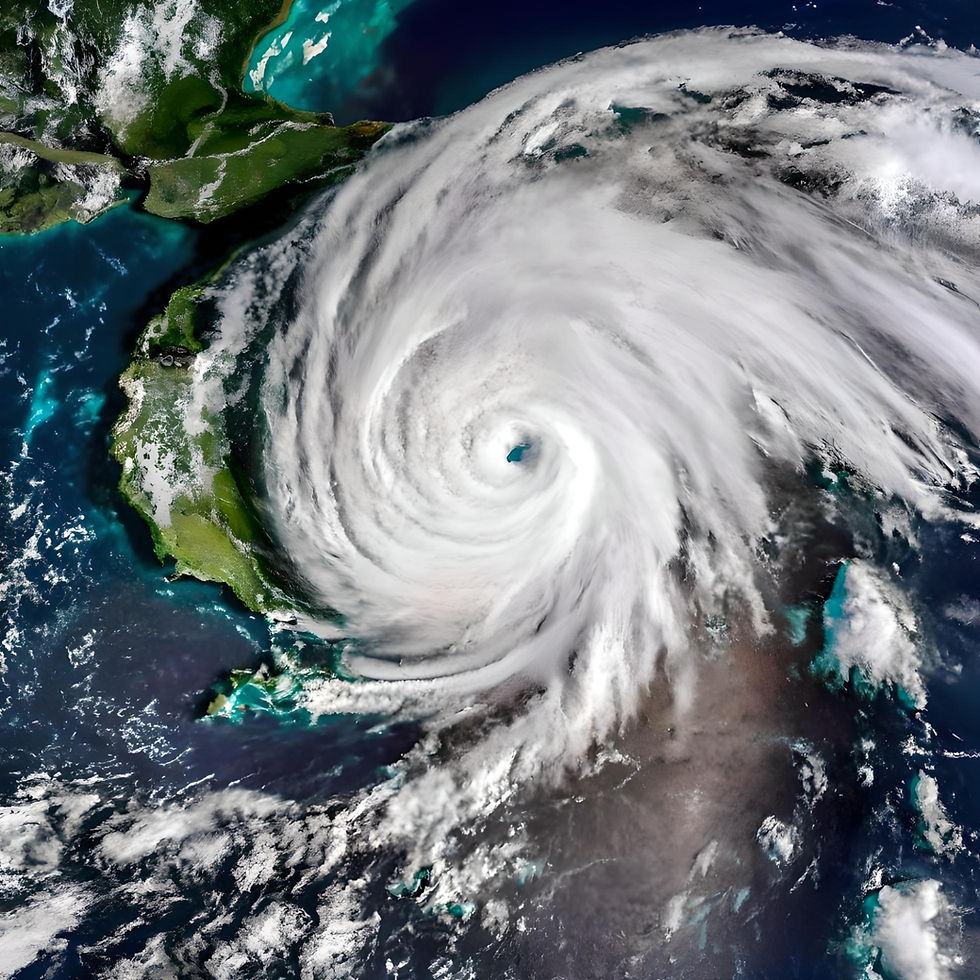Green Campuses Lead the Way to True Net Zero / Low-Carbon Future
- Smruti
- Aug 30, 2023
- 8 min read
Updated: Aug 31, 2023
In an era marked by unprecedented environmental challenges, sustainability education has emerged as an effective tool in our battle against climate change. Being a multifaceted concept, it embodies a commitment to meeting the needs of the present without compromising the ability of future generations to meet their own needs.

Children spending leisure reading time in a Green Campus Program - Pledged school
Today, we are here with one of the pioneers, who has been championing her journey of creating zillions of smiles and positive impacts through sustainability education. She has bigger goals and unstoppable aspirations.

Presenting Ms. Rekha Lalla, Lead – Green Campus Program, The Climate Project Foundation (India & South Asia branch of The Climate Reality Project).
Rekha is a CII-certified expert in Climate Change and sustainability. She is a TEDx Speaker on Climate Change & sustainability. She comes with experience as an educator for 25+ years. Now she is crafting her experiences in leading the Green Campus Program. Let us get to know more about the Green Campus Program, which has created a stir in the sphere of climate change mitigation, climate action, and measurable impacts. And guess what? The major tool behind this is sustainability education.
1. Tell us about why and how Sustainability Education serves as an effective tool for mitigating the issues and effects of the climate crisis.
“Sustainability education improves people’s ability to assimilate information, calculate risks, prepare for climate crises, and recover from their effects,” Rekha remarked.
She further explains that it equips individuals, communities, and societies with the knowledge, values, and skills necessary to address the complex environmental challenges we face. It contributes to creating a sustainable future by fostering awareness; promoting informed decision-making (by empowering people to make environmentally conscious choices further encouraging sustainable lifestyles); encouraging innovative solutions; building resilience; adapting resource-efficient ways and more. Climate change is a multidisciplinary challenge. Sustainability education integrates knowledge from various fields, including science, economics, social sciences, and ethics, to provide a holistic understanding of climate-related issues.

At The Climate Project Foundation, one of our flagship projects is the Green Campus Program, which primarily works on the principles of sustainability and climate change education, and majorly aligns with SDG 13 and 4.7. Sustainability education is a powerful catalyst in the global battle against climate change that drives our revolutionary program!
2. Tell us more about the Green Campus Program. What is its process?
Green Campus Program enables schools and colleges to conserve natural resources like water and biodiversity, optimize energy efficiency, manage waste, and educate about climate change and sustainability while addressing the well-being of the students as compared to conventional educational institutes.
Those educational institutions pledged for this transformative journey, not only decrease water waste but may also contribute to enriching water reserves, preserving natural resources, defending biodiversity, and enhancing air and water quality.
It has a three-pronged approach:
Stage 1 - Awareness:
We generate awareness through the Principals’ Conclave attended by Principals, Deans, and HODs of the educational institutions, followed by the Teachers’ Training Program which is attended by the teachers.
Simagesome of the interactive workshops & sessions with the educators - Keep Clicking on the Slider to View Images
Stage 2 - Action:
The institutions registered for the Green Campus Program work on 5 thrust Areas – Air and Health, Water Management, Waste Management, and Energy Efficiency with constant guidance and support by our team, followed by an audit.
Here is a quick glimpse of the initiatives undertaken by different schools and colleges. You will find an anthology of amazing interventions, each speaking a beautiful story on conserving energy & water, and making resource-efficient campus through installations of LED lights, Solar Panels, Wastewater treatment, Rainwater Harvesting, Farming - vegetable, herbal and butterfly gardens, Vertical Green walls, Waste segregation, Composting, Reuse of wastes (including eco-brick bench), cycling to school, and more. Take a look. Scrolling down is insightful here!!
Stage 3 - Accolades / Awards:
Based on the initiatives undertaken by the registered educational institutions, and the impacts of ideas and practices The Climate Project Foundation recognizes the campus as Green and awards them. Based on the results, a rating is provided for each Green Campus-certified school (Platinum, Gold, Silver & Bronze).
In this entire process, not just the educators, but also the students and local community come together to work for the common goal. We believe that the climate crisis needs a long-term and highly impactful solution, and there is no better tool to resolve it than education. By inculcating the values and behavioral and attitudinal change that make our future generations more planet-sensible, we try to accelerate the learning dividends by setting examples right there on the campuses of their schools, colleges, or universities.
3. How would any educational institution get enrolled and start with it?
Schools, colleges, or universities can register with us by filling out our registration form.
Once they get registered, they can avail 6 days of the Teachers’ Training Program
Later after forming a GCP Committee, they can begin the Pre audit.
Later Audit is followed by monitoring and Changes as required by schools/Colleges.
Verification by us and rewards
A Glimpse of GCP Committee Meeting
4. What are the impacts of GCP?
Green Campus Program takes an impactful shift from conventional to the creation of Resource-efficient and Net Zero/ Low Carbon Campuses. The campuses work on lowering their damaging impacts on the atmosphere by creating sustainable Living Labs as a live example, and promoting green living amongst students. Green campuses teach by doing it e.g. lowering the usage of normal electric grids, not using the municipal water source, reusing wastes and more.
The most tangible benefits are the reduction in water and energy consumption right from day one of implementation. The energy savings could range from 20 -30 % and water savings around 30 - 50%, reducing energy and water bills, respectively. Other than that, waste is effectively managed and repurposed. By enhancing biodiversity, one can get to see a drastic change in the areas converted into green patches.
5. The legacy of the Green Campus Program goes back to…
Its inception took place in 2019. Since then, we have awarded more than 50 schools for their commendable work in converting their conventional school campuses into Green Campuses. 1000+ campuses have embarked on the journey, 200+ schools are undertaking this program and 11000+ teachers have been trained.
6. Is the Green Campus Program, only for educational institutions?
The Green Campus Program (GCP) is not limited to educational institutions. Any organization, that has awareness about green building facilities and is willing to undergo such transformation can opt for this program. In fact, corporates can implement it in their campuses, and/or utilize their CSR funds to support GCP for the educational institutions, especially those in the rural areas.
7. How we can work on its scalability?
I feel that it is time the climate & green finance aspect is focused on now when we talk about scalability. This model is of course replicable, and we have our own unique methodologies to make it happen. However, we can go at a certain pace being a not-for-profit organization; hence with thriving support from different organizations on the CSR front, I think we can take it higher level at a faster pace. We would love to see some enthusiasm from the corporate sector for this.
8. How do you feel being part of this revolutionary climate change mitigation model?
Well, its very rewarding. It (sustainability education and Green Campus Program) is a space that allows you to blend, science and art in a creative yet logical way. I try utilizing my skills and experience to their optimal level in catapulting this, and for a strong cause. Like I said it feels very rewarding.
9. A message you would like to give out to the educational institutions.
This Program is a great way of learning for the students, teachers, and everyone involved in the sphere of the Green Campus Program. Let students learn from the activities and audits, and not just them, everyone involved in the process will experience great takeaways. Commercially, you save a lot on the bills; optimize the usage of available resources; and the best part is you innovate and engage with the communities.
We have several schools that produce their own food with the help of their farming exercise. We have seen yarn spinners too in a school that produces fabric for the uniform. One school has taken: cycle to school” initiative. Many such inspiring and self-led initiatives have come out, as a result of the GCP implementation.
If I speak of attitudinal reformation, once you have it implemented in your school, college, or university, or in any campus for that matter you can never go back to the mindset you were in prior to the enrolment in this program. It not just transforms the campuses; it changes the lives. It changes the perceptions of the people, and how they see nature. It’s an experience of a lifetime as you connect better with yourself and nature.
It was a good eye-opening rendezvous with Ms. Rekha Lalla. The Green Campus Program (GCP), being a flagship project of The Climate Project Foundation, acts as a vital tool in the fight against climate change. By converting traditional campuses into eco-friendly spaces, GCP harnesses education's transformative power to address the climate crisis. This program models planet-conscious behavior and cultivates values in the next generation that make them more sensible towards nature and offer effective & long-term solutions.
Click here to witness one of our Green Campus Program - certified campus that has undertaken milestone-worthy initiatives to tread the path of True Net Zero or Low Carbon Future. This is one such campus of many.
We'll be back with some more real stories adding to the saga of sustainability education and the Green Campus Program. Till then, take care and be Planet-Wise.
About Rekha Lalla
Rekha Lalla is a multifaceted individual making a meaningful impact. She's a certified expert in Climate Change and Sustainability, a compelling TEDx Speaker, and a dedicated Buddhist scholar. With over 25 years in education, she's shared her expertise in Science and led as Head at TERI Prakriti School, Gurgaon. She holds dual master's degrees in Botany, highlighting her commitment to the environment. She's an Environmentalist, Mentor, and Climate Reality Leader, nurturing future environmental leaders.
Rekha's creativity extends to art, with exhibitions at renowned venues. She's also authored engaging children's books on General Knowledge and Science, inspiring young minds. Her influence reaches environmental projects, with roles supported by the Delhi Government's Department of Environment. She's also designed educational toys for LEO METTLE Thomson Connect. Collaborating with various NGOs, Rekha's work has received accolades, including recognition from former Chief Minister Ms. Sheila Dixit. She exemplifies the power of passion and dedication in creating positive change. To know more about her, take a peek at her LinkedIn profile.
About the Author
The author, Smruti Sweta Samantray, a Climate Reality Mentor, at The Climate Reality Project, has been advocating sustainability education, especially in the preschool segment, and in the allied areas of sustainability for more than seven years now. Academically, she has pursued a Master’s in Mass Communication, and Environmental Law. Currently, she is working as Manager of Communication and Collaboration at The Climate Project Foundation (The Climate Reality Project— India & South Asia branch). Professionally, she is known in the domain of marketing communications for her innovative/ creative initiatives, for ten years. She has counseled approximately 3,000 students and 1,500 parents on choosing the right career paths. She has written 3500+ feature stories along with research papers (one of them published with Cambridge Scholar Publishing), and reviewed 40+ books. She is very enthusiastic, and passionately working towards communication in the sphere of sustainability and CSR.
To know more about her, take a peek at her LinkedIn profile.










































































SUDIRMAN168
SUDIRMAN168
SUDIRMAN168
SUDIRMAN168DAFTAR
SUDIRMAN168LOGIN
SUDIRMAN168ALTERNATIF
SUDIRMAN168TERPERCAYA
SUDIRMAN168MAXWIN
SITUSPILIHANSUDIRMAN168&LAPAKBET777
LAPAKBET777
LAPAKBET777RESMI
LAPAKBET777GACOR
LAPAKBET777DAFTAR
LAPAKBET777LOGIN
LAPAKBET777ALTERNATIF
LAPAKBET777MAXWIN
TERMINAL4D
Daftar Link Dofollow
lapak7d
lapak7d
lapak7d
lapak7d
lapak7d
lapak7d
lapak7d
lapak7d
lapak7d
lapak7d
lapak7d
lapak7d
lapak7d
situs slot demo
slot demo X1000
scatter hitam
slot toto
situs slot online
situs slot online
situs slot online
situs slot
situs slot
situs slot
situs slot
sudirman168
sudirman168
sudirman168
slot gacor
toto singapure
situs toto 4d
toto slot 4d
pg soft mahjong2
mahjong2
pocari4d
pocari4d
pocari4d
pocari4d
pocari4d
pocari4d
pocari4d
terminalbet
terminalbet
data pemilu
utb bandung
universitas lampung
slot bonus new member
ksr88
ksr88
ksr88
ksr88
Slot Dana
situs slot gacor hari ini
terminal4d
terminal4d
terminal4